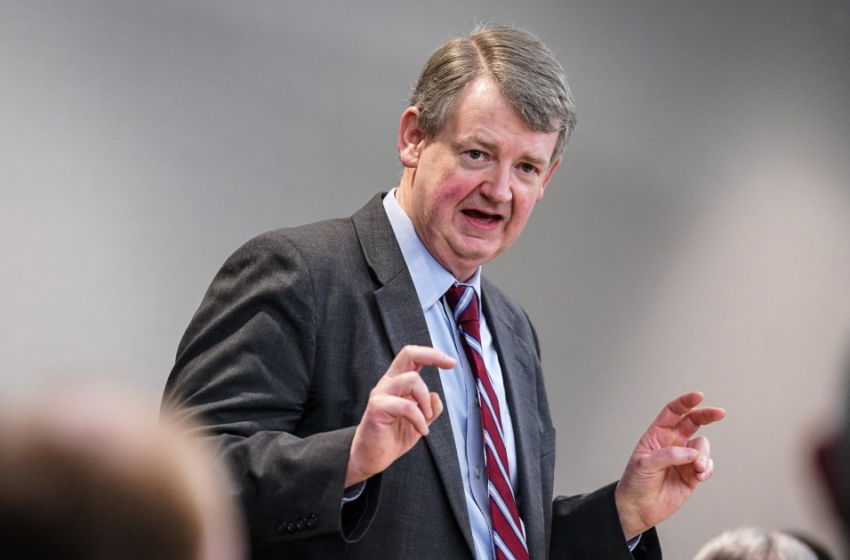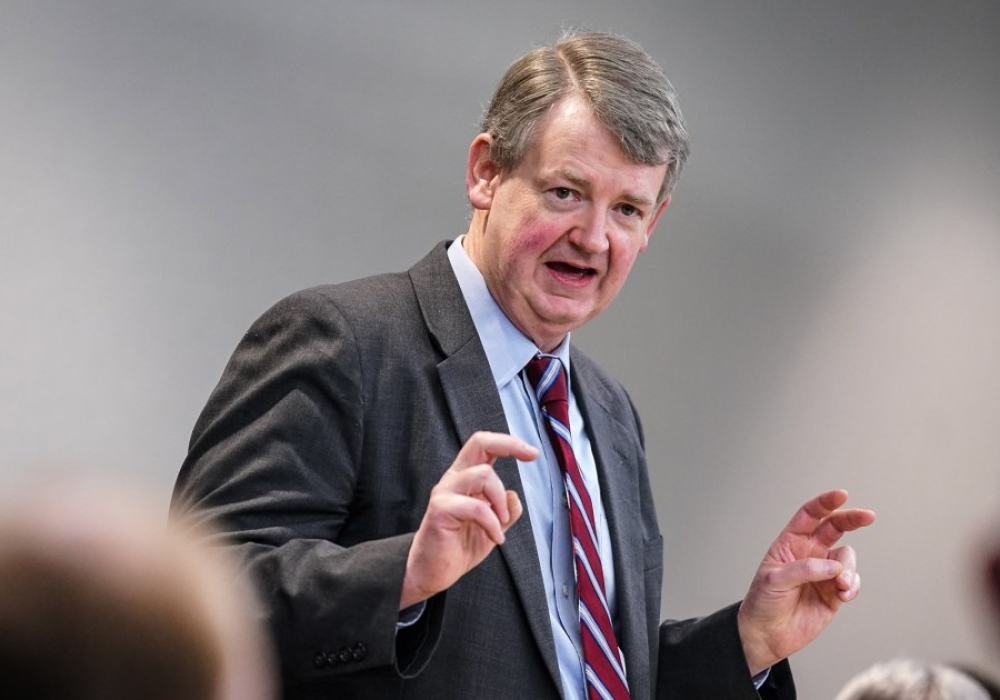Before the murder trial began for the three white men accused in the killing of Ahmaud Arbery, who was Black, race was expected to be a major theme in the case.
Jurors were asked if they supported Black Lives Matter, if they had participated in any racial justice demonstrations and if they considered the Confederate flag to be racist. All but one Black person was struck from the jury. Eleven of the 12 jurors selected are white.
The topic of race, however, was hardly broached during testimony before the prosecution and defense rested their cases last week.
But allegations of racism have persisted, directed not at the men accused in Arbery’s killing, but at the attorney representing one of them.
Kevin Gough, an attorney for William “Roddie” Bryan, has been condemned for trying to have “high-profile African Americans” thrown out of the courtroom, derided for his complaints that the jury didn’t contain enough “Bubbas or Joe six-packs” and admonished by the judge for equating Black faith leaders with klansmen.
Lee Merritt, who is representing Arbery’s mother, Wanda Cooper-Jones, said Gough’s statements, outside the ears of the jury, have become “more targeted, more persistent and more racist.”
On Nov. 11, Gough tried and failed to prevent “high-profile African Americans” like the Revs. Al Sharpton and Jesse Jackson from being in the courtroom, alleging they would influence the jury.
“We don’t want any more Black pastors coming in here,” Gough said in court, a day after Sharpton sat in the public gallery with Arbery’s mother.
That same day, he questioned what would happen “if a bunch of folks came in here dressed like Colonel Sanders with white masks sitting in the back” — apparently equating African American civil rights and faith leaders to the KKK. The judge admonished the remark Monday as “reprehensible.”
“I don’t think he sees Black people as particularly civilized, so he doesn’t understand that we can show up without causing a mistrial,” Merritt said. “That we can be controlled and supportive without being rambunctious.”
Merritt on Thursday joined hundreds of mostly Black pastors outside the Glynn County Courthouse in Georgia, where they gathered in response to Gough’s request to keep them out of the courtroom.
Merritt said he believes Gough is “agitating the Black community” on purpose to cause a mistrial.
David Henderson, a former federal prosecutor who is now a civil rights lawyer and CNBC contributor, said he believed Gough’s comments to be both racist and incompetent.
“It’s hard for me to differentiate between how racist I think it is compared to how incompetent I think it is,” Henderson said. “I know that’s a strong word to use; I don’t think I can avoid it in his situation.”
Gough’s client is a neighbor of father and son Gregory and Travis McMichael. The men are accused of chasing Arbery in separate pickup trucks Feb. 23, 2020, through the Satilla Shores neighborhood where they lived. Travis McMichael got out of his truck and briefly fought with Arbery before he fatally shot him at close range. The defense has said the men suspected Arbery was a burglar.
Before his comments targeting Black pastors and civil rights leaders, Gough came under scrutiny for trying to ban peaceful demonstrators from gathering outside the courthouse to call for justice for Arbery.
He also threatened to file a so-called Bubba motion, Merritt said. “Bubba” is a term Gough used to describe white men older than 40 who do not have a college degree. He said the jury needed more Bubbas.
“He’s making these absurd motions, and the goal, I think, in part, is to intimidate the family,” Merritt said. “Most of his motions have been directed at the family of the victim in the case. And so, I think the other part is that he knows that he’ll get a reaction from the Black community.”
The Rev. James Woodall, the former state president of Georgia’s NAACP chapter who has closely watched the trial, said Gough’s challenge of the presence of prominent civil rights leaders in the courtroom “is a desperate attempt to make it appear that the defendants are not being given a fair trial.”
He said he agreed with the court that “such references have no place in judicial proceedings and are reprehensible.”
Woodall, a public policy associate at the Southern Center for Human Rights who has met Arbery’s family, said he was not surprised by Gough’s behavior.
“This is a highly publicized trial in a small, rural community,” Woodall said. “Emotions are high, and the stakes are higher.”
Gough, who did not return multiple phone and email requests for an interview, earned his law degree from the University of Georgia. He grew up on Long Island in New York and was elected multiple times as the chair of the Republican Party in Glynn County.
In 2012, he became the Brunswick Judicial Circuit public defender. He was fired from that role in April 2016 for a host of reasons including having been “derelict” in his duties as a circuit public defender, refusing to abide by the agency’s directions and not representing his clients appropriately, according to his letter of removal from Bryan Tyson, who was then the executive director of the Georgia Public Defender Council.
“Your own agenda has overshadowed any other issues that may exist,” the letter said.
Tyson described the Brunswick office as one with a culture of “fear and intimidation,” according to statements during Gough’s appeals hearing.
Henderson said he didn’t have high hopes for Gough after the attorney suggested his client wasn’t smart enough to speak on his own behalf during an interview with CNN’s Chris Cuomo last year. Bryan had not yet been arrested.
“My client is a mechanic with a high school education, and if you’ve ever been to the high schools around here, that’s not necessarily saying much, OK?” Gough said at the time. “And I don’t mind if the board of education doesn’t like it.”
Henderson said he walked away thinking “that’s the worst that I’ve ever seen a lawyer do representing their client in terms of how he presented him to the point of insulting his client’s intelligence and his education.”
Gough has only gotten more offensive as the trial has gone on, Henderson said.
He said he believes Gough is picking up on “the fact that attention is being turned on to the case in a way that could be detrimental to his client because people are demanding justice.”
“He simply doesn’t know how to talk about race, which is a problem that America has and has had, period,” Henderson said.





